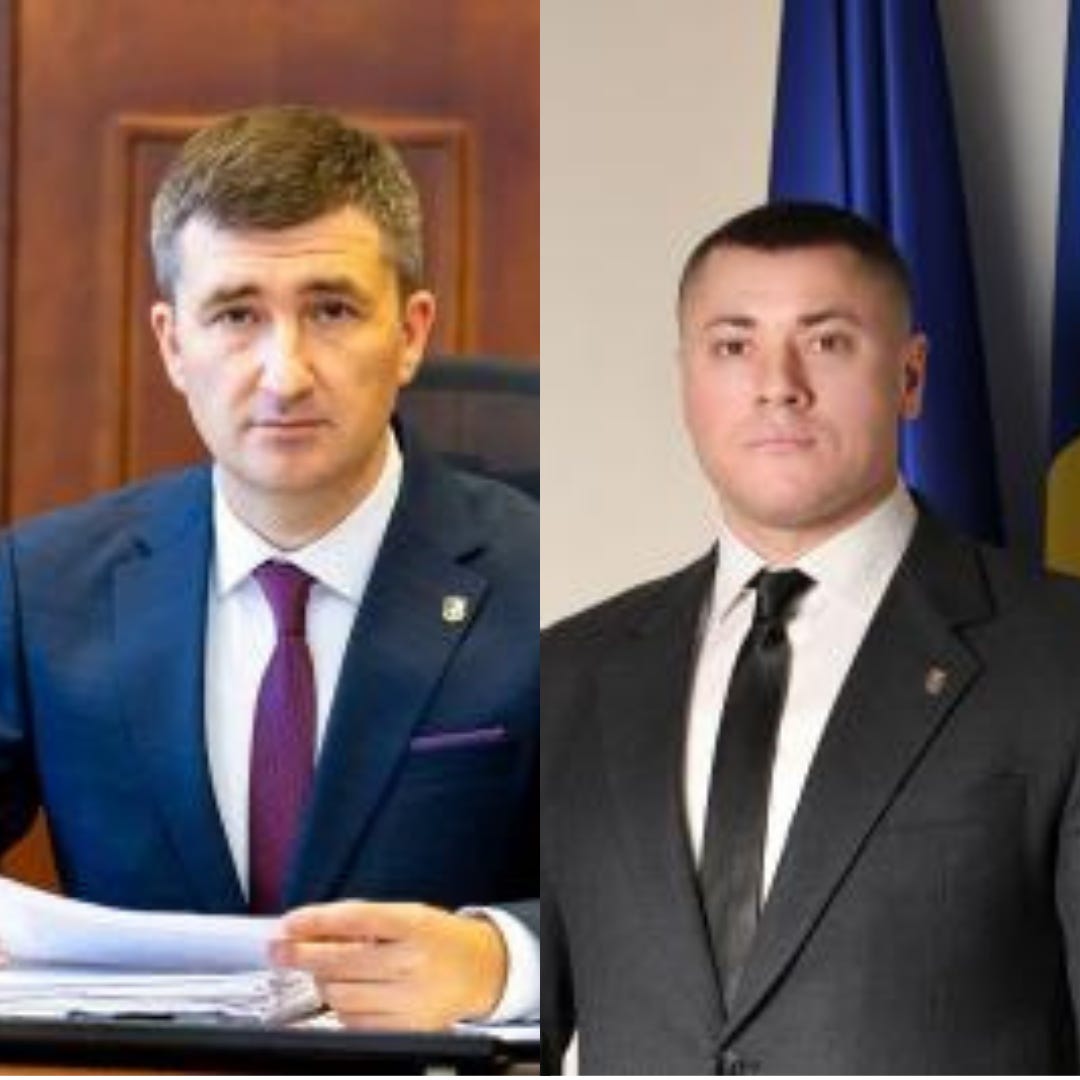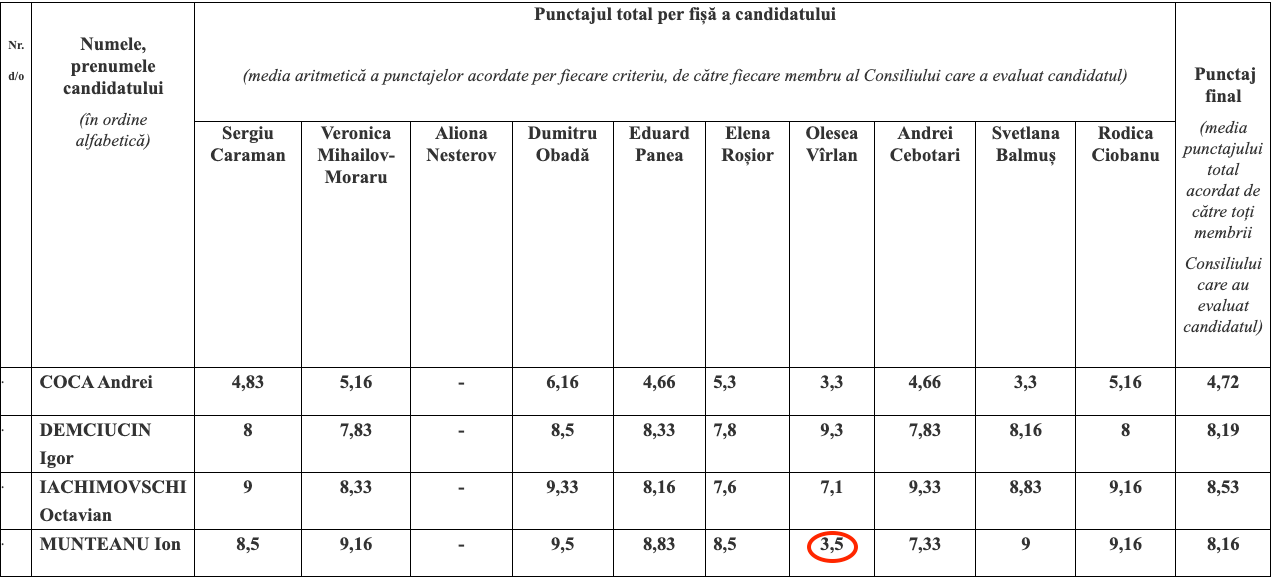Welcome back to Moldova Matters! Once again large stories that require more time and attention than the Weekly Roundup format will allow have distracted us a little. We’ll be back soon with a roundup covering all the other important news of the last week. For now, we need to take a deeper dive into an important story in Moldova’s attempts to reform the justice system.
Moldova Fails to Appoint a General Prosecutor… again
Moldova faces another setback in justice reform as the Superior Council of Prosecutors (SCP) abruptly canceled the competition for a new General Prosecutor last week. The news broke shortly after the SCP announced that Octavian Iachimovschi won the competition and that he and the runner-up Igor Demciucin would move forward from the evaluation process to the vetting process. This announcement led to calls from the losing candidates to publish the full results of their evaluations. Once the SCP met to consider the release of this information, they decided abruptly to cancel the competition and issue the following statement:
"A major discrepancy was detected, which had no coverage from the perspective of arguing why one of the candidates was de-pointed",
If none of that made much sense to you, you’re not alone. The process of appointing a new General Prosecutor has become a drawn out byzantine process. In order to explain what happened and what it means we need to back up to October 2023 when this latest iteration began.
How we got here…
In October of last year President Sandu announced the removal of Alexandr Stoianoglo from the office of General Prosecutor. Mr. Stoianoglo had been suspended from office since 2021 pending the outcome of multiple criminal cases against him which were all proceeding incredibly slowly. The President and parliament moved last year to finally remove him and in October announced a new competition for the role of General Prosecutor. In this process, the Superior Council of Prosecutors (SCP), which had finished the pre-vetting1 process, would gather applications for the position and then select the most qualified candidate by means of a rubric based assessment. This candidate, and the runner up, would proceed to a vetting process and then to a final confirmation process. Critically, the EU has set the appointment of a General Prosecutor as a key milestone in the process of justice reform that should take place before accession negotiations start this summer. The plan was to have a new General Prosecutor confirmed and in office in March 2024.
This process did not have a very good start. Initially, only 2 people applied for the job, Deputy Acting General Prosecutor Igor Demciucin and a lawyer named Ilya Rotaru. Mr. Rotaru is currently appealing a 9 year prison sentence for the crime of stealing a building. He’s also a sort of perennial candidate for all open positions in the justice sector and is routinely disqualified based on his prior conviction. This led the SCP to extend the call for applications by a month which resulted in 4 candidates after Mr. Rotaru and one other were disqualified:
Octavian Iachimovschi - Deputy at the Anti-Corruption Prosecutor’s Office
Ion Munteanu - Acting General Prosecutor
Igor Demciucin - Deputy Acting General Prosecutor
Andrei Coca - Lawyer who previously applied to be a judge on the Constitutional Court but was rejected twice.
Why the competition was canceled
According to the President of the SCP Dumitru Obada, the problem came from the score that SCP member Olesea Vîrlan gave to Ion Munteanu. She rated Mr. Munteanu 3.5 / 10 while the average score of the other 8 members of the SCP was an 8.72. Critically, without this anomalous score, Mr. Munteanu would have won the competition. With it, he placed 3rd. You can see this summarized on the table of scores below.
Explaining her move, Olesea Vîrlan stated that "All possible mistakes occur in any calculations." She noted that when the “mistake” was brought to her attention she joined the other members of the SCP in calling for the cancelation of the whole competition.
President of the SCP Dumitru Obada stated that until they reviewed all the scores in preparation of releasing them publicly, the SCP had not discussed individual scores choosing to keep them private and only deal in averages. This rather disastrous decision led to the announcement of a victor, followed immediately by a cancelation of the contest.
In a public statement following the announcement Mr. Obada stated:
"I didn't see any plausible reasons justifying the application of this score, a fact that not only caused bewilderment, but for me - shock. I wanted very much to have finality and a fair contest. With this risk, there is the option: either you accept this mathematical reality and move forward, which for me as a CSP member is inadmissible…[or you cancel the competition (paraphrased)]”
He went on to state that the appointment could not go forward in a just manner under these conditions. He also stated that he expects Olesea Vîrlan to resign her position on the SCP and that if she does not, he will resign himself.
A Criminal Investigation is Opened
Anti-Corruption Prosecutor Veronica Dragalin reacted angrily to the news of the cancelation of the competition. Initially she called an in-person meeting of the General Assembly of Prosecutors (all prosecutors in the country) to gather to discuss the situation. She then announced that she was opening a criminal investigation into the proceedings which she would be personally conducting saying:
“I decided to conduct this investigation myself; I don’t want any of my subordinates in the Anti-Corruption Prosecutor’s Office to investigate such a delicate matter. This criminal process may affect members of the Supreme Council of Prosecutors and candidates who participated in the competition,”
What happened and who is being investigated?
Firstly, it’s important to say that the story is still developing and we don’t yet know exactly what happened or why. It is clear that Dragalin and others believe that this was not a simply “mistake” but a more nefarious attempt to manipulate the appointment of the next General Prosecutor. Some developments in the story from today, Monday March 4th, may indicate what is to come.
Firstly, this morning Olesea Vîrlan resigned from her role on the SCP, a move that President of the SCP Dumitru Obada said showed “maturity and responsibility” for her actions.
Next, Acting General Prosecutor Ion Munteanu appealed to the SCP asking that his deputy Igor Demciucin be removed from the position of Acting Deputy General Prosecutor. Mr. Munteanu stated:
"I declare absolute distrust towards the deputy of the acting General Prosecutor, Igor Demciucin"

Following his request, the SCP chose to dismiss Mr. Demciucin and at the request of the Acting General Prosecutor appoint Sergiu Brigai in his place. Mr. Brigai has recently passed the vetting process and was due to be appointed as a judge.
Mr. Munteanu alleged that his deputy was conducting some manner of unsanctioned investigation against him. During this process, Mr. Demciucin had presented information from an anonymous telegram channel which sought to draw a personal connection between Mr. Munteanu and Aliona Nesterov which resulted in Nesterov’s recusal from the SCP evaluation panel (you can see her name on the chart above without scores). Mr. Demciucin also allegedly tried to force the recusal of Dumitru Obada, President of the SCP without success.
It is also worth noting that Olesea Vîrlan ranked Mr. Demciucin moderately higher than the other evaluators at the same time that she ranked Mr. Munteanu substantially lower.
What does this all mean and what is next?
The main thing to watch for in the coming weeks will be Anti-Corruption Prosecutor Veronica Dragalin’s criminal investigation. Based on today’s developments this will most likely focus on whether or not there was an attempt by Mr. Demciucin or Olesea Vîrlan to rig the competition in favor of a candidate. At this point all we have is a firing, a resignation and a lot of speculation.
If corruption is found, this whole saga will draw serious questions about how the process of justice reform is being carried out. It is worth nothing that Olesea Vîrlan has been through pre-vetting and any finding that implicates her in corruption will further degrade public faith in this process.
That said, even if there is no corruption here and this is simply a strange comedy of errors, it has very serious implications. The failure to appoint a General Prosecutor at this time will result in the organization of a new competition which could take 2-3 months or longer. That would be followed by vetting, and assuming there are no other twists and turns in the story, someone could be appointed perhaps 6 months from now. This far exceeds the EU’s suggestion / deadline and creates at best political difficulties for Moldova beginning EU accession negotiations this summer.
Furthermore, whatever happened, this has seriously damaged the credibility of the PAS party’s ability to move forward on even first steps in the justice reform process. This was further highlighted when the former General Prosecutor Alexandr Stoianoglo was acquitted in one of his ongoing criminal cases last week. Anti-Corruption Prosecutors are appealing the acquittal and he has other active cases, but the former General Prosecutor has not given up on returning to his job and is seeking reinstatement in court.
All this adds further chaos and uncertainty to the top post in Moldova’s prosecutorial system. It has been hard enough for the government to attract qualified candidates to apply for this role. It will likely be even harder going forward.
The SCP is now reviewing the process and trying to figure out a way that this cannot happen again in the future. Public discussion has coalesced on either letting the SCP members simply vote for their preferred candidate without the numerical evaluation, or in using the mean rather than average of the collected scores in order to exclude outliers.
We will continue following this story as it unfolds over the coming weeks and months.
Pre-Vetting was a stage during which the Superior Council of Prosecutors, Superior Council of Magistrates and top courts subjected their members to vetting by an independent body. This group checked income and expenses as well as past decisions by members of the groups being vetted for indications or corruption or illicit enrichment. Pre-Vetting is designed to be followed by a longer “Vetting” process by which these newly “cleaned” institutions would look at their broader membership, prosecutors and judges respectively, and subject them to the same process.




